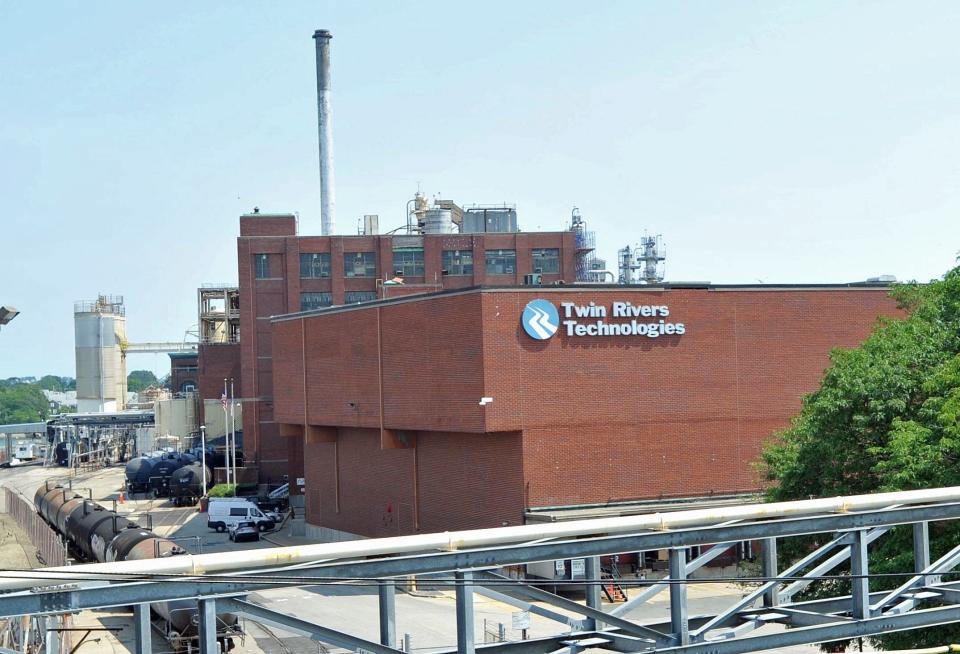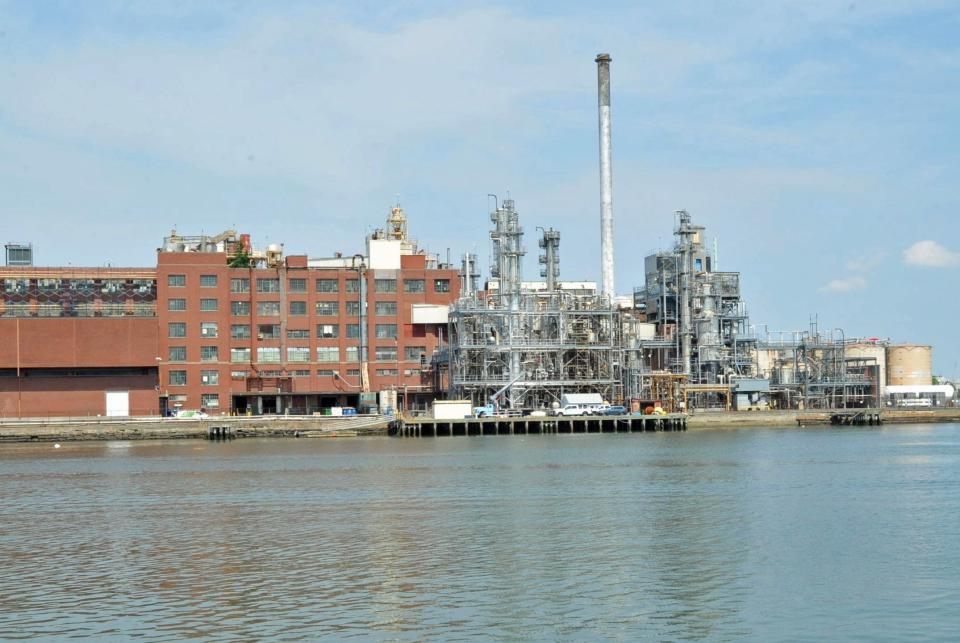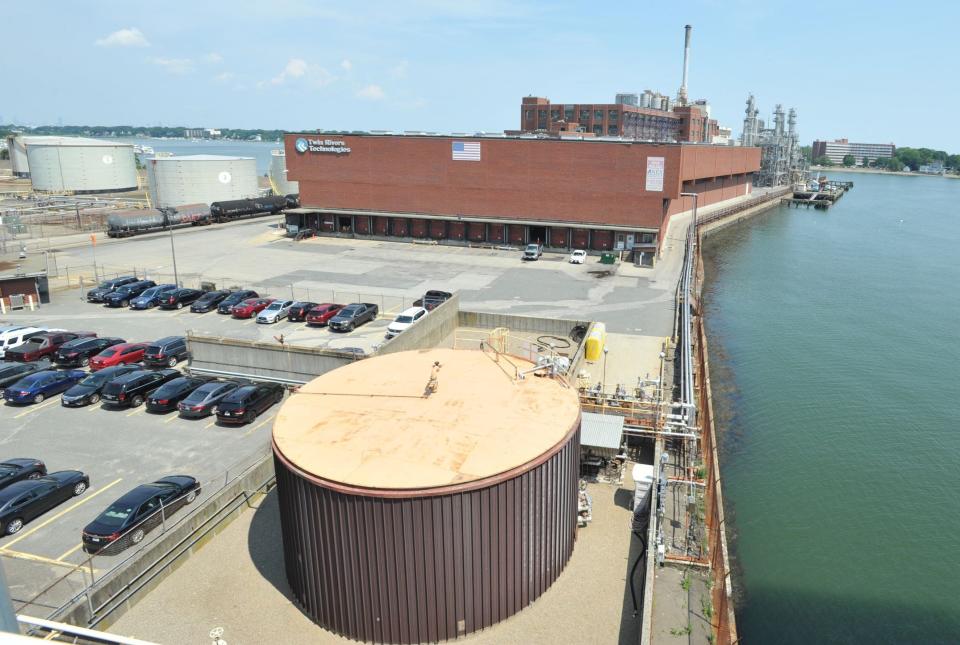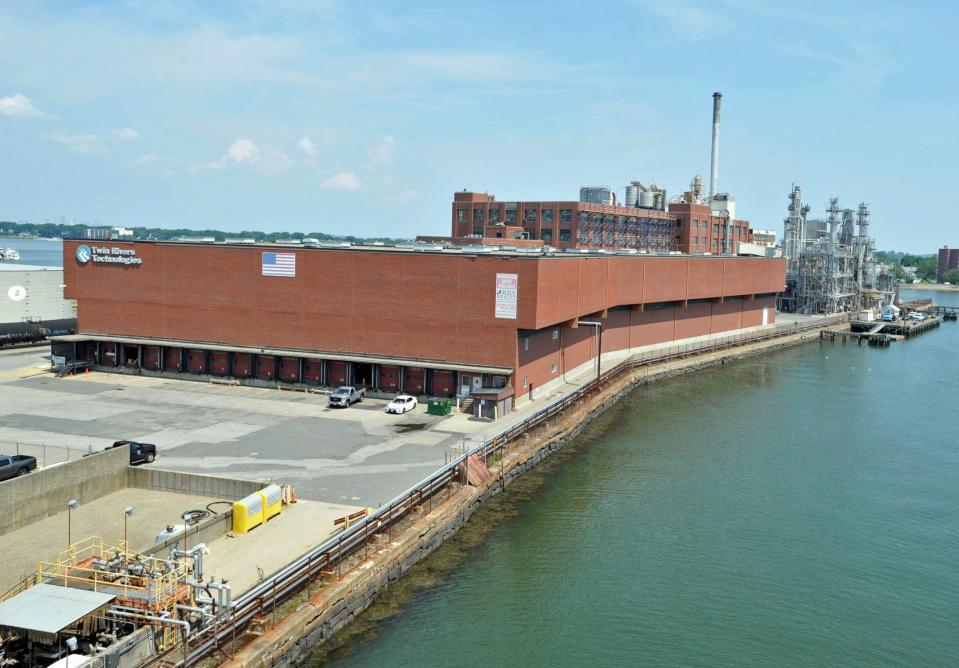Environmental advocacy group sues Twin Rivers Technologies in federal court
QUINCY – An environmental advocacy group has sued Twin Rivers Technologies in federal court, claiming the manufacturer is violating the Clean Water Act and the Clean Air Act.
The Conservation Law Group issued a news release Tuesday announcing "a citizen suit" against the manufacturer for "polluting the air and two local rivers."
Twin Rivers Technologies operates out of the former Procter & Gamble soap manufacturing plant on the Quincy side of the Fore River Bridge. The glycerin and fatty acids made at the plant contribute to the production of soaps, detergents, lubricants, personal care products, pharmaceuticals, cosmetics, food products and more.

The Conservation Law Foundation is a nonprofit organization with more than 5,400 members in New England, including members who live or spend time near Twin Rivers and the adjacent river and bay, according to the complaint.
The group said Twin Rivers is releasing oil and grease, heavy metals and other harmful substances into the water as well as "dangerous amounts of volatile organic chemicals and other air pollutants into nearby neighborhoods."
The facility's operations harm nearby residents, Conservation Law Foundation attorney Erica Kyzmir-McKeon said in the news release.
“The stench and polluted air and water from Twin Rivers has negatively impacted the health and quality of life of community members for too long," Kyzmir-McKeon said. "Everyone in this community has a right to clean air and water. This facility needs to own up to its unlawful actions and prioritize stopping this pollution for good.”
In a media statement on behalf of Twin Rivers Technologies, ML Strategies Senior Vice President of Strategic Communications Nancy Sterling wrote:
“Twin Rivers Technologies (TRT) finds the allegations in this lawsuit inaccurate, denies them and will vigorously oppose them in court. We demonstrate daily our ongoing commitment to sustainability and compliance which has earned us global, national and regional recognition and a valued positive relationship with the Quincy community. Guided closely by regulators, these efforts will continue in spite of (the Conservation Law Foundation's) unwarranted claims.”

What the Conservation Law Foundation seeks to achieve
The lawsuit asks the court to order Twin Rivers to stop the alleged violations and seeks civil penalties "of up to $64,618 per day per violation for all violations occurring after Nov. 2, 2015."
In an email to The Patriot Ledger, Heather Govern, Conservation Law Foundation vice president and director of clean air and water, said her group hopes to settle rather than go to trial. Settlement money, she said, would go toward an environmental project undertaken by a local nonprofit "to mitigate the pollution and the company's past violations."
If the case does go to a full trial, Govern said the penalty would be paid to the U.S. Treasury.
Govern said Twin Rivers Technologies recently contacted the Conservation Law Foundation about its claims. She said she's hopeful settlement discussions will continue so both parties can avoid heavy litigation costs.
"After years of unlawful polluting, this is an opportunity for the company to right the wrongs they've inflicted on Quincy and other nearby communities," Govern said.
Due to the large number of claims raised in the complaint, Govern said she doesn't expect a resolution this year.
"And if settlement talks break down at any point, (the Conservation Law Foundation) will be forced to move the litigation schedule forward," she said.

Alleged water pollution
The Conservation Law Foundation alleges that Twin Rivers has failed to properly manage its discharges of wastewater and stormwater into the Weymouth Fore River and Town River Bay. The plant draws in water to cool equipment before releasing it back into the river and the bay.
In its 47-page complaint, the Conservation Law Foundation says Twin Rivers Technologies violates the Clean Water Act by discharging water at temperatures exceeding permissible levels.
That can kill fish, insects and other aquatic species and increase pathogens, algal blooms and invasive species, according to the complaint.
The complaint also alleges that Twin Rivers Technologies exceeded permissible flow rates of water discharged into the Weymouth Fore River in July 2018 and again in August 2019, a violation which the Conservation Law Foundation says can harm and kill wildlife.
A further Clean Water Act violation alleged in the lawsuit is runoff of oil, grease, nitrogen and zinc. Oil and grease, the complaint says, can produce "rancid odors, form toxic products and harm aquatic life and wildlife."
Nitrogen, according to the Conservation Law Foundation, contributes to harmful outbreaks of algae, which turn the water a murky green and block sunlight from bottom-dwelling plants. Fish and other wildlife struggle for oxygen under those conditions. According to the complaint, that produces "dead zones," where marine life once flourished but can no longer because of a lack of oxygen.
The Conservation Law Foundation cites a federal Centers for Disease Control and Prevention report linking zinc to human health problems, including brain damage, infertility, pancreatic damage and anemia.
Alleged air pollution
The complaint says Twin Rivers Technologies releases excessive amounts of three harmful pollutants into the air: carbon monoxide, nitrogen oxides and volatile organic chemicals.
Carbon monoxide, when inhaled, decreases human blood oxygen levels, and exposure to elevated levels increases health risks for those suffering from heart disease, the complaint says.
Short-term exposure to nitrogen dioxides can aggravate asthma and other respiratory diseases, according to the Conservation Law Foundation. Long-term exposure can cause asthma and increase susceptibility to respiratory infection, the complaint says.
Volatile organic chemicals, according to a federal Environmental Protection Agency report, can cause breathing difficulties, nausea, and eye, nose and throat irritation. The chemicals have been known to damage the central nervous system and other organs. The complaint notes that some volatile organic chemicals have been linked to cancer.

Thanks to our subscribers, who help make this coverage possible. If you are not a subscriber, please consider supporting quality local journalism with a Patriot Ledger subscription. Here is our latest offer.
This article originally appeared on The Patriot Ledger: Conservation Law Foundation sues Twin Rivers Technologies

